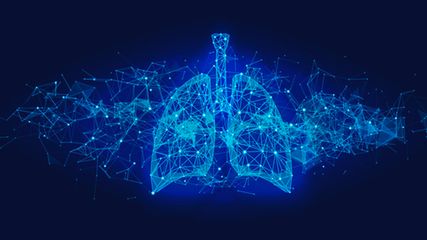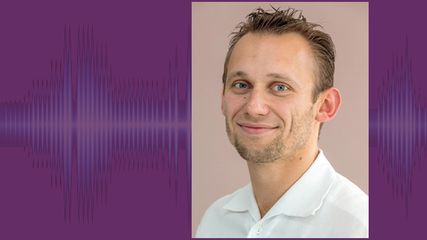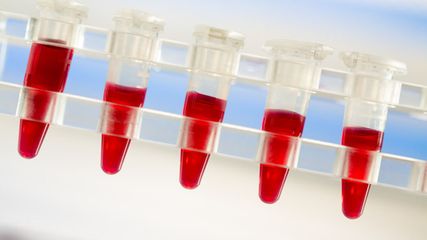
«Young physicians who are interested in research leap forward in their abilities»
Unsere Gesprächspartnerin:
Dr. med. Annaïse Julie Jauch
Department of Hematology
University Hospital of Basel
E-Mail: annaise.jauch@unibas.ch
Das Interview führte Ingeborg Morawetz, MA
The Swiss Cancer Institute’s Young Oncology Academy (YOA) is a support and mentorship program for young oncologists. The program is aimed at junior doctors with a clear focus on cancer medicine, hematology, radiation oncology, urology, gynecology, pathology or dermatology who wish to make an active contribution to clinical and translational research. Academy participants are supervised by a renowned faculty member for almost a year. We spoke to Dr. med. Annaïse Julie Jauch, who is taking part in the Young Oncology Academy this year.
Congratulations on being accepted into the Young Oncology Academy! How did you hear about the opportunity to apply for the program?
A. J. Jauch: Colleagues from the oncology and hematology department have been in the previous academies. I heard their reports about the academy and the big conferences they attended. It was super cool to see how young physicians who are interested in research leap forward in their abilities to organize scientific questions and to critically analyze their findings, thanks to their participation in the Young Oncology Academy. In the inauguration day of this year’s program it was said that the youngsters have the red carpet – I witnessed this with my friends in the previous years and am now experiencing it myself.
What are your expectations for this year in the Young Oncology Academy?
A. J. Jauch: The set-up of the program is quite strict and extremely structured: On the one hand, there are lessons on communication, public speaking and related topics, which is very important in clinic and research; on the other hand, we will learn how to deal with scientific findings, with applications for grants and we will be instructed in how to create the architecture for a good scientific talk. Core lessons are also on setting up re-search information and research questions, and how to integrate research in a clinical day by day. I am expecting many different interesting building blocks.
Are there any specific events you’re looking forward to this year?
A. J. Jauch: What helped me the most so far and what I am eager to learn more about is the information on grant writing and on protocol writing and the biostatistician meeting – because it is not sufficient to think up a great research question, you also need the framework around it and, of course, the money to finance the project.
What will you benefit most from at the YOA?
A. J. Jauch: It is helpful to meet and connect with other physicians who also try to balance the challenge of having two jobs, in a way, and to learn about possibilities of being good at both: as a doctor and as a scientist. It is an interesting exchange to learn about how people keep up to date in these two specific fields in general, but also on a daily basis – how you can combine research and practice and still enjoy what you’re doing. I want to get up in the morning and look forward to my work. I want to keep the ambition and the pleasure of having the honor to combine both parts of the job.
What path are you on right now and what is your goal in your medical and scientific career?
A. J. Jauch: I just finished my first year of hematology education, so I have three more years to go. At the moment, I’m interested in inborn errors of immunity, genetically determined diseases. Iwant to know about which problems of the immune system can actually lead to a predisposition for cancer development. It is also fascinating to aim at finding out if there are even more diseases that we don’t know about yet.
Are you in a research project at the moment?
A. J. Jauch: Only in my free time. I have an old project with my former PI from my PhD education, in which we looked at one of these inborn errors of immunity, and we actually described a new form of it. Now we try to learn how this new form impacts the immune system.
In the oncology department I am part of a research project about the non-malignant disease immune thrombocytopenia. This project was my first possibility to be involved in a clinical study. In this study we tried to use the common second line therapy as first line therapy.
We are also looking at the T lymphocytes, in order to find out if we could sequence their receptors when we are seeing a response to certain treatments. Then those receptors could function as biomarkers to predict which patients would profit from therapy.
Who is your mentor in the YOA? Are you conducting research together?
A. J. Jauch: My mentor is Prof. Dr. med. Urban Novak from Bern. He’s doing a great job in the field of lymphomas and he did beautiful work in Switzerland and the United States. We are not involved in a project together – yet. But I am positive we will manage at one point. If you have certain rare diseases, it is important to work together, especially in a country as small as Switzerland.
Is it sometimes difficult to be taken seriously as a young doctor?
A. J. Jauch: On the research side, I’m not yet taken seriously because I’m not established. I don’t have my own lab. I am taking baby steps and working my way through. As a clinician I am also still a lightweight, because so far I have only done one year of hematology. That’s not enough time to see everything and to be entirely confident.
That’s why it is priceless to be able to knock on other physicians’ doors and to profit from their knowledge – not only about clinical practice, but also about the developments in science and medicine.
Have you got any role models in the medical world or from your private environment?
A. J. Jauch: I’m a big fan of my sister. She started out as an archaeologist, then had children and after that did something totally different: She is now a nurse in psychiatry and is very good at it. For me, she is a role model in that you can start again from scratch, do something you didn’t expect to do before and have fun while doing it.
In the medical field, it’s Jean-Laurent Casanova. He is a pediatrician and in the field of rare inborn errors of immunity. He is a great observer, took many of his observations to the laboratory and described numerous new diseases.
If you wouldn’t be a doctor which career would you have chosen?
A. J. Jauch: Bioengineering would have been a good option for me, because it also has a structured approach to research. Even now, it could be helpful for me in addition to medicine.
What surprised you most on your way into hematology and oncology?
A. J. Jauch: How fast the field is evolving. A decade or two ago, immune therapy was very rare. By now the field has exploded thanks to many researchers who invested a lot of time and curiosity. Our arsenal of therapies has expanded enormously. It is very precious to see how things that you develop in the lab really can have benefits in the lives of patients.
How did you get to know the Swiss Cancer Institute?
A. J. Jauch: I first came upon the Swiss Cancer Institute when I was doing a rotation in the oncology department. At the time, the institute was recruiting patients for different research projects and trials. One of the resident physicians of the department was involved in many of the trials and officially introduced me to the Swiss Cancer Institute. It is incredible how it connects so many different hospitals and organizations. Thanks to the Swiss Cancer Institute, they can work together and sustain a framework for research. Together we can try to ameliorate our patients’ lives.
Das könnte Sie auch interessieren:
Erhaltungstherapie mit Atezolizumab nach adjuvanter Chemotherapie
Die zusätzliche adjuvante Gabe von Atezolizumab nach kompletter Resektion und adjuvanter Chemotherapie führte in der IMpower010-Studie zu einem signifikant verlängerten krankheitsfreien ...
Highlights zu Lymphomen
Assoc.Prof. Dr. Thomas Melchardt, PhD zu diesjährigen Highlights des ASCO und EHA im Bereich der Lymphome, darunter die Ergebnisse der Studien SHINE und ECHELON-1
Aktualisierte Ergebnisse für Blinatumomab bei neu diagnostizierten Patienten
Die Ergebnisse der D-ALBA-Studie bestätigen die Chemotherapie-freie Induktions- und Konsolidierungsstrategie bei erwachsenen Patienten mit Ph+ ALL. Mit einer 3-jährigen ...


